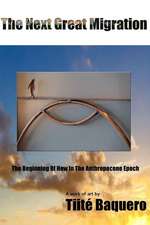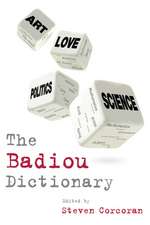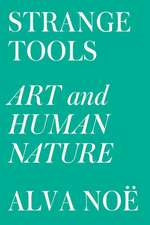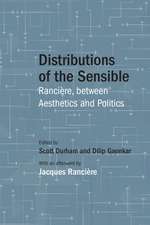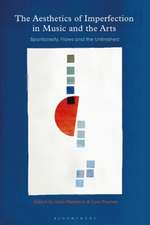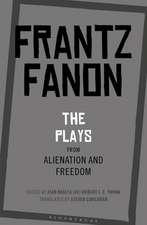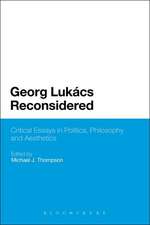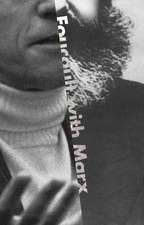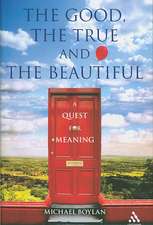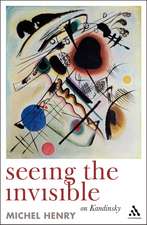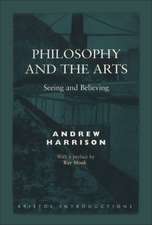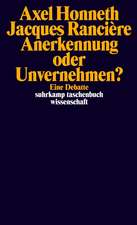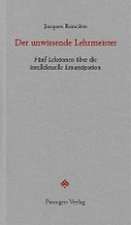Dissensus: On Politics and Aesthetics
Autor Jacques Rancière Introducere de Steven Corcoranen Limba Engleză Paperback – 29 iul 2015
| Toate formatele și edițiile | Preț | Express |
|---|---|---|
| Paperback (1) | 89.11 lei 6-8 săpt. | +67.34 lei 6-12 zile |
| Bloomsbury Publishing – 29 iul 2015 | 89.11 lei 6-8 săpt. | +67.34 lei 6-12 zile |
| Hardback (1) | 201.06 lei 3-5 săpt. | |
| Bloomsbury Publishing – 16 ian 2010 | 201.06 lei 3-5 săpt. |
Preț: 89.11 lei
Preț vechi: 146.00 lei
-39% Nou
Puncte Express: 134
Preț estimativ în valută:
17.05€ • 17.84$ • 14.16£
17.05€ • 17.84$ • 14.16£
Carte tipărită la comandă
Livrare economică 03-17 aprilie
Livrare express 26 februarie-04 martie pentru 77.33 lei
Preluare comenzi: 021 569.72.76
Specificații
ISBN-13: 9781472583550
ISBN-10: 1472583558
Pagini: 248
Dimensiuni: 129 x 198 x 20 mm
Greutate: 0.27 kg
Editura: Bloomsbury Publishing
Colecția Bloomsbury Academic
Locul publicării:London, United Kingdom
ISBN-10: 1472583558
Pagini: 248
Dimensiuni: 129 x 198 x 20 mm
Greutate: 0.27 kg
Editura: Bloomsbury Publishing
Colecția Bloomsbury Academic
Locul publicării:London, United Kingdom
Caracteristici
Serves as the ideal companion to Rancière's bestselling The Politics of Aesthetics
Notă biografică
Jacques Rancière taught at the University of Paris VIII, France, from 1969 to 2000, occupying the Chair of Aesthetics and Politics from 1990 until his retirement. Steven Corcoran is a writer and translator living in Berlin. He has edited and/or translated several works by Jacques Rancière, including Dissensus (Continuum, 2010) and A Lost Thread (Bloomsbury, forthcoming) and two works by Alain Badiou, Polemics (2006) and Conditions (Continuum, 2008).
Cuprins
AcknowledgementsEditor's Introduction Part I: The Aesthetics of Politics 1. Ten Theses on Politics 2. Does Democracy Mean Something? 3. Who is the Subject of the Rights of Man? 4. Communism: From Actuality to Inactuality 5. The People or the Multitudes? 6. Biopolitics or Politics? 7. September 11 and Afterwards: A Rupture in the Symbolic Order? 8. Of War as the Supreme Form of Advanced Plutocratic Consensus Part II: The Politics of Aesthetics 9. The Aesthetic Revolution and its Outcomes 10. The Paradoxes of Political Art 11. The Politics of Literature 12. The Monument and its Confidences; or Deleuze and Art's Capacity of 'Resistance'13. The Ethical Turn of Aesthetics and Politics Part III: Response to Critics 14. The Use of Distinctions NotesIndex
Recenzii
Rewarding in its scholarly engagement with Derrida, Arendt, Lyotard et al ... [Rancière] has a certain sardonic precision.
An accessible introduction to Rancière's thought and an essential collection of his essays.
Steven Corcoran has provided a timely and coherently organized collection of Rancière's short writings, one that can stand as a solid introduction to the author's thought...There is a distinct shift of emphasis that occurs in Rancière's writings around the late 1990's, however, and the task of a good collection would be to capture both periods and the thematic interaction between them. The writings gathered here, which date from 1996 to 2004, perform both tasks admirably...For those who seek to get a sense of both the richness and the breadth of the work of one of the most significant thinkers of our time, Dissensus provides a valuable resource. I can think of no better starting point than this collection.
Title mention in Times Higher Education, January 2010
An accessible introduction to Rancière's thought and an essential collection of his essays.
Steven Corcoran has provided a timely and coherently organized collection of Rancière's short writings, one that can stand as a solid introduction to the author's thought...There is a distinct shift of emphasis that occurs in Rancière's writings around the late 1990's, however, and the task of a good collection would be to capture both periods and the thematic interaction between them. The writings gathered here, which date from 1996 to 2004, perform both tasks admirably...For those who seek to get a sense of both the richness and the breadth of the work of one of the most significant thinkers of our time, Dissensus provides a valuable resource. I can think of no better starting point than this collection.
Title mention in Times Higher Education, January 2010

